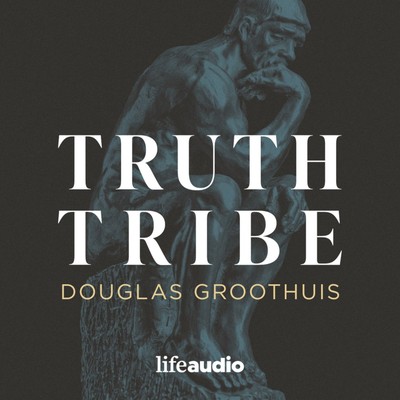Jesus and Buddha
April 10, 2023 ● 15 minShare this episode
I. Truth and Religion
A. Framing the great debate on religion and spirituality
Taking objective truth seriously in a pluralistic, postmodern setting
B. The appeal of the oneness claim (all religions teach basically the same thing): religious strife is eliminated. But this must be logically tested.
II. What are Truth Claims in Religion?
A. Defining the nature of truth: that which corresponds to objective reality. For more on this, see Douglas Groothuis, Truth Decay (InterVarsity Press, 2000), chapter four.
B. Defining a truth-claim: a statement that claims to describe objective reality
C. The logic of truth-claims—rules of the intellectual system, rational analysis
1. The law of noncontradiction: A is not non-A (contradictory statements cannot both be true; nothing possesses contradictory properties)
2. Examples of the law of noncontradiction in religious truth-claims
a. Buddha cannot be enlightened and not enlightened at the same time; the claim is that he became enlightened.
b. Jesus cannot be the Christ (Messiah) and not be the Christ (Messiah). The claim is he always was the Messiah.
c. If what Buddha affirms about reality contradicts what Jesus affirms about reality, then both Buddha’s and Jesus’ view of reality cannot be true. They could both be false if some other worldview is true.
A. This fundamental law of logic is a necessary assumption for all rational discourse.
III. Similarities Between Jesus and Buddha
A. Both are world-historical founders of major religions
B. Their lives are enshrined in sacred texts
C. Both exhibited profound compassion and gathered followers
D. Both emphasized the need to find enduring peace
E. Both taught basic ethical teachings on love and respect, versions of the Golden Rule
IV. Jesus and Buddha: Key Differences of Worldview
A. Do two major religions agree on core issues or disagree? If they disagree, they cannot be one in essence; cannot both true
B. Documents on Jesus and Buddha
1. Buddha: Large body of texts far removed in history from life of Buddha. Miracles are not central to the message (dharma) of Buddha.
2. Jesus: Four Gospels (and the rest of the New Testament) are written a few decades after Jesus’ time on earth by eyewitnesses or those who consulted them. Miracles are central to the message of Jesus. See Douglas Groothuis, On Jesus, chapter two.
C. The worldview of Siddhartha Gautama, the Buddha (ca. 566-486 BCE)
1. Ultimate reality or the sacred—atheistic or agnostic on God; but nirvana exists
2. The human condition—suffering is due to craving and ignorance
3. Spiritual liberation/salvation
a. “Four noble truths”—freedom from craving through insight into the cause of suffering
1. Life is suffering
2. Suffering is caused by craving
3. The cessation of craving leads to liberation
4. The way of liberation is through the Eightfold path
b. The Eightfold path—wisdom, ethical conduct, mental discipline
c. The afterlife: reincarnation/karma or nirvana (release from reincarnation)
D. The worldview of Jesus, the Christ (Messiah)
1. Ultimate reality—a personal and moral Creator God (Matthew 22:37-39)
2. Human condition—image bearers of God estranged from God (Mark 7:21-23; See Romans 3:14-26 also)
3. Spiritual liberation/salvation
a. Repentance; turning from self-centeredness (sin) to God’s authority (Matthew 4:1: Luke 24:45-47)
b. Belief and trust in Jesus himself for eternal life (John
1:12-13; 3:16; 14:6; Romans 10:9). You have to do something with Jesus
c. The redemptive power of the suffering death (Cross) of
Jesus Christ (Matthew 20:28; 25-28; Romans 5:6-8)
4. The afterlife: Either fellowship with God and the
redeemed or eternal punishment (Matthew 25:31-46)
E. Two momentous lives compared
1. Buddha—a sage, teacher, and reformer. Sought enlightenment through knowledge and experience; shared this with others
2. Jesus—claimed to be God in human form (unrepeatable)
a. Never sought enlightenment, but began ministry in power and confidence (Matthew 4)
b. Offered to provide forgiveness for sin against a holy God (Mark 2:1-12; John 3:16-18)
c. Claimed to be one with a personal God (John 8:58; John 10:22-31)
IV. Conclusion: Between Jesus and Buddha— Gospel or Dharma?
A. Buddhism and Christianity cannot both be true; they contradict each other on crucial matters of worldview and spirituality: A cannot be non-A (the law of noncontradiction)
B. Objective truth
Today's Devotional
A Prayer to Help You Comfort Others - Your Daily Prayer - April 25
Have you ever wondered if there is any purpose in your suffering? We certainly don’t go looking for suffering—it comes to us because life is a journey through difficulties and triumphs. Sufferings are a reminder of what Jesus Christ went through and it is a way for us to encourage others.
Christian News
The latest news and hot topics trending among Christian music, entertainment and faith life.










